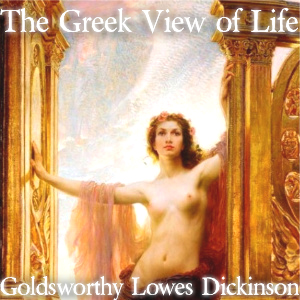- Art
-
- general
- Family
- Physics & Mechanics
- Poetry
- Comedy
- Arts
- humor
- Music
- Exploration
- medieval
- contemporary
- ballads
- Erotica
- Law
- History
- Atheism & Agnosticism
- Essays
- Historical
- Design & Architecture
- Leisure
- Writing & Linguistics
- Health & Fitness
- True Crime
- Fiction
- Crafts & Hobbies
- Education
- Sports Fiction
- Letters
- Society & Culture
- Religious Fiction
- Elegies & Odes
- Family & Relationships
- Business & Economics
- Narratives
- Travel Fiction
- Lyric
- Sports & Recreation
- Transportation
- religion
- Science
The Greek View of Life
by Goldsworthy Lowes DICKINSON (1862 - 1932)11 - I.11 The Greek View of Death and a Future Life

“With the Greek civilisation beauty perished from the world. Never again has it been possible for man to believe that harmony is in fact the truth of all existence.” This elegantly-written work provides a splendid introduction to the Greeks of the classic period: how they thought, wrote, and organised their lives and loves. Although it dates from the 1890s, there is very little about it that has dated. To its author’s credit, the subject of “Greek love” is dealt with in a sane and factual context - despite the judicial assassination of Oscar Wilde going on in the background. A Cambridge don much admired by his students (including E. M. Forster), Goldsworthy Lowes Dickinson belonged to the Apostles, a secret society with a strong ethic of male friendship. Alfred Tennyson and his beloved Arthur Hallam were early members. Dickinson is chiefly remembered as a historian and pacifist who played a significant part in the founding of the League of Nations. Inevitably, given his interests and intellectual background, he became a close associate of the Bloomsbury Group. The Greek View of Life is no dry academic tome. It is a popularizing work in the best sense: accessibly written and illustrated with apt quotations given in sturdy translations, never in the original Greek. It is a joy to read. (Introduction by Martin Geeson)
Listen next episodes of The Greek View of Life:
12 - I.12 Critical and Sceptical Opinion in Greece , 13 - I.13 Ethical Criticism , 14 - I.14 Transition to Monotheism , 15 - I.15 Metaphysical Criticism , 16 - I.16 Metaphysical Reconstruction - Plato , 17 - I.17 Summary , 18 - Chapter II: The Greek View of the State. Section 1 - The Greek State a 'City' , 19 - II.2 The Relation of the State to the Citizen , 20 - II.3 The Greek View of Law , 21 - II.4 Artisans and Slaves , 22 - II.5 The Greek State Primarily Military, not Industrial , 23 - II.6 Forms of Government in the Greek State , 24 - II.7 Faction and Anarchy , 25 - II.8 Property and the Communistic Ideal , 26 - II.9 Sparta , 27 - II.10 Athens , 28 - II.11 Sceptical Criticism of the Basis of the State , 29 - II.12 Summary , 30 - Chapter III: The Greek View of the Individual. Section 1 - The Greek View of Manual Labour and Trade , 31 - III.2 Appreciation of External Goods , 32 - III.3 Appreciation of Physical Qualities , 33 - III.4 Greek Athletics , 34 - III.5 Greek Ethics - Identification of the Aesthetic and Ethical Points of View , 35 - III.6 The Greek View of Pleasure , 36 - III.7 Illustrations - Ischomachus; Socrates , 37 - III.8 The Greek View of Woman , 38 - III.9 Protests against the Common View of Woman , 39 - III.10a Friendship (1) , 40 - III.10b Friendship (2) , 41 - III.10c Friendship (3) , 42 - III.11 Summary , 43 - Chapter IV: The Greek View of Art. Section 1 - Greek Art an Expression of National Life , 44 - IV.2 Identification of the Aesthetic and Ethical Points of View , 45 - IV.3 Sculpture and Painting , 46 - IV.4 Music and the Dance , 47 - IV.5 Poetry , 48 - IV.6a Tragedy (1) , 49 - IV.6b Tragedy (2) , 50 - IV.7 Comedy , 51 - IV.8 Summary , 52 - Chapter V: Conclusion